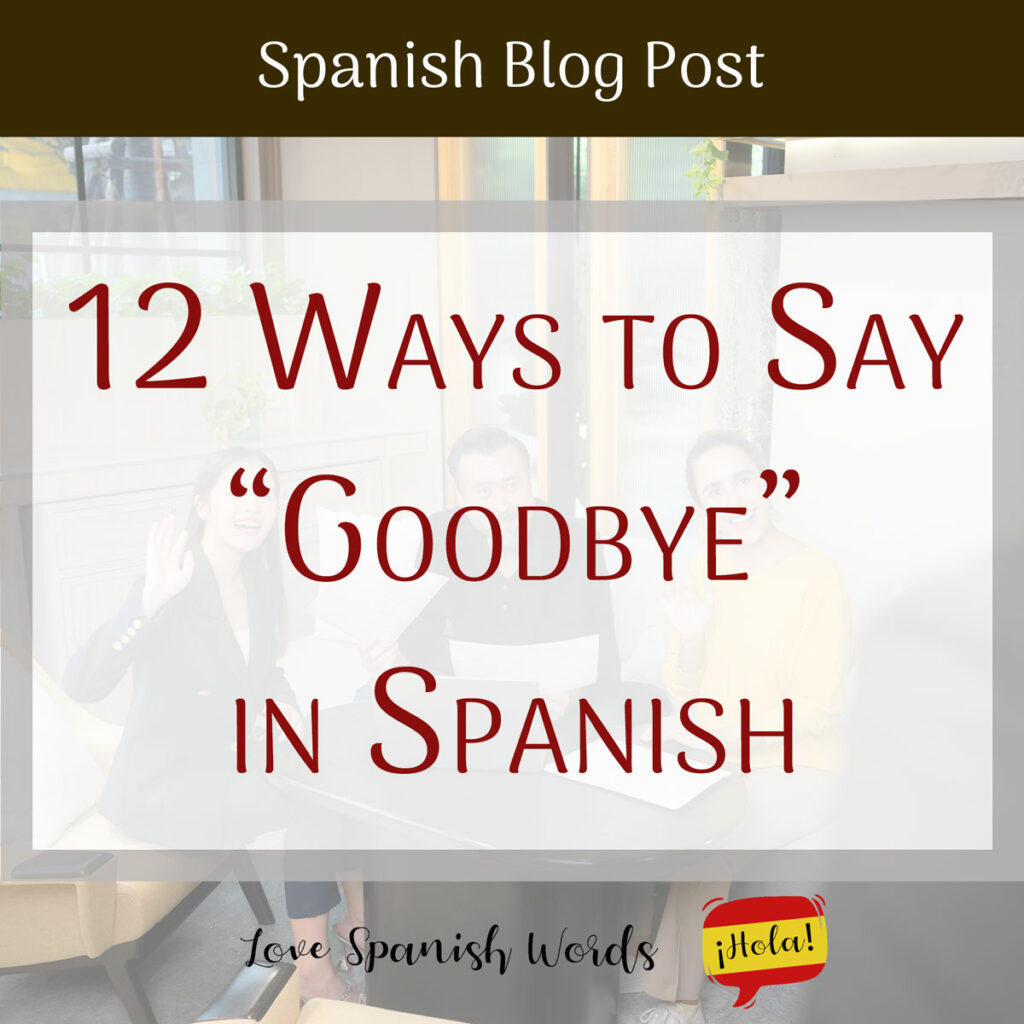Saying goodbye in Spanish is simple – all you need to do is say adiós. However, if you want to impress with your Spanish-speaking skills, you can expand your vocabulary by learning other common phrases to bid someone farewell. Today we will review some informal and informal ways to say goodbye in Spanish and how to appropriately use them so you can sound more fluent.

Adiós
The most common and well-known word used across Spanish-speaking countries is the simple and easy-to-pronounce adiós. It’s the equivalent of goodbye in English. This word works in any setting but is the most appropriate for formal settings or any situation involving a farewell.

Fun Fact: The literal translation for adiós is to God, which is similar to saying go with God. It’s normal in Latin America for the older generation to give you a kind farewell and say Vaya con Dios (Go with God). It’s seen as a kind statement and a wish for God to take care of you on your journey and in your life.
Hasta luego
Hasta luego is a popular phrase for saying goodbye to someone you will see again in the future, such as colleagues, friends, family, or even your barista. The literal translation is until then and it can be used in formal and informal settings.
Nos vemos
Nos vemos is the Spanish translation of see you but the literal translation is we see each other. It’s a way of telling the other person you’ll see each other later. You can add different endings to this phrase to be more specific about the time you’ll see them again. They are as follows:
- Nos vemos mañana. = See you tomorrow.
- Nos vemos pronto. = See you soon.
- Nos vemos la próxima semana. = See you next week.
- Nos vemos el próximo mes. = See you next month.
- Nos vemos el próximo año. = See you next year.
- Nos vemos en unos días. = See you in a few days.
- Nos vemos el viernes. =See you Friday.
- Nos vemos más tarde. = See you later.
- Nos vemos por ahí. = See you around.

Colloquial Uses:
Allí nos vemos is an informal and colloquial way of saying see you around. The literal translation is see you there.
Ay nos vemos, on the other hand, is the slang and shortened version heard most frequently, with ay being the grammatically incorrect version of the words allí and ahí (both mean there). If you use this phrase with friends, you are bound to sound like a native Spanish-speaker.

Te veo
Te veo is quite similar to nos vemos, except it’s on a more personal and direct level. It means I’ll see you. It’s informal language, so you would only use this phrase with friends and close family. It can also be used formally if you change the article te to lo or la. La veo mañana (feminine) or lo veo manana (masculine) (I’ll see you tomorrow) can be used with a parent or someone to whom you want to show respect. The same endings listed above for nos vemos can be added after te veo.
Hasta pronto
Hasta pronto translates to until soon. It’s used mostly in informal conversations and is a great way to say goodbye to friends and family. Although it’s a more common greeting in informal settings, it doesn’t necessarily sound bad to use it in formal settings too if you plan to see the person soon.
Hasta la próxima
Hasta la próxima is very similar to hasta pronto. The difference is pronto means soon and próxima means next. Although both imply that the date of the future meeting is unknown, using próxima sounds more uncertain than pronto. The direct translation in English is until next time.
This phrase is mostly used in informal settings, but it’s a good choice of words to use with a friend or someone you haven’t seen in a long time and probably won’t run into again anytime soon.

Hasta mañana
In contrast to hasta pronto and hasta la próxima, which are goodbyes with an unknown date for a future meeting, hasta mañana is more specific. It translates to until tomorrow. This is used with someone you plan to see the next day and can be used in both formal and informal settings.
Hasta la vista
Anyone who has seen the Terminator franchise has heard the following phrase: Hasta la vista, baby. Contrary to what you may have seen on TV, this is not a very common goodbye in Spanish. However, I’m including it on this list because there is the possibility you might hear it one day in an informal setting. The literal English translation for hasta la vista is until the view, but it means see you around or so long.
Cuídate
Cuídate is the imperative form of cuidar, which means to take care of. Adding te at the end makes it reflexive: to take care of yourself. It’s often used as a farewell in informal situations.
A possible translation of this word is also beware, so it can be used in farewells with someone who is about to travel or when saying goodbye at night and you want them to be safe. The formal equivalent of this word is cuídese. It can be used towards someone you respect.

Chao or Chau
Another way to say bye is chao or chau. This Spanish word is taken from the Italian word ciao. This informal farewell is common when ending a call. Although it’s heard in most Latin American countries, it’s the main way of saying bye in countries with a large Italian influence such as Argentina, Uruguay, and parts of Brazil. It’s also the main way of saying goodbye in Chile and Spain.
Feliz noche / Buenas noches
Feliz noche and buenas noches are time-specific. They are said at the end of the day and translate to happy night and good night respectively. They are regularly said when texting or ending a phone call at night. Buenas noches is the most popular farewell when night comes around, so don’t be shy to use it late in the evening when leaving someone or a group of people.
Me despido
Me despido is a very proper way of saying goodbye. The literal translation is I dismiss myself and it sounds like the English translation I bid you farewell. Despido comes from the Spanish verb despedir which has many meanings such as to lay off, to dismiss, and farewell.
It’s habitual to add a second goodbye after the phrase such as Me despido. Que pases buenas noches. (I dismiss myself. Have a good night.) Although it sounds quite formal, it’s okay to use the phrase in informal settings too. You can use it when you excuse yourself from an event, such as a birthday party, gathering, meeting, or the dinner table, or when ending a conversation via a call or text.


